Finally, here are short life-sketches of a small cross-section of martyrs
Com. Subrata Dutt (Jouhar) (1946—29.11.75)
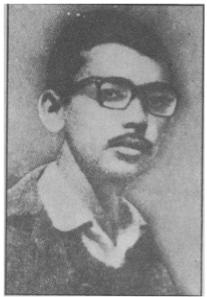
Comrade Subrata Dutt was born in a middle class family of Calcutta. His father was a founder-leader of the Students’ Federation in Bengal. In 1953 he joined the Hindustan Times as a journalist and the Dutt, with their four sons and two daughters, moved to Delhi. It was in Delhi that Jouhar spent his early student-life, passing with distinction the School Leaving Certificate examination in 1961 from the Raisina Bengali High School. After that he returned to Calcutta and joined the Guest Keen Williams as an apprentice.
In Calcutta Jouhar came to identify himself with the growing tide of anti-imperialist, anty Congress awakening in its diverse expressions, and joined the communist movement. During the 1962 India-China war he resolutely stood against the wave of chauvinism. He also took keen interest in the film society movement and other progressive cultural activities and was a founder-member of the South Calcutta Cine Club. After the 1964 split in the CPI, Jouhar rejected the old revisionist leadership to join the CPI(M). But this fight against revisionism continued in this new party, and following the Naxalbari peasant uprising as the struggle against neo-revisionism mounted within the CPI(M) Jouhar revolted and left the party. After a short stint with the MMG group, he joined the CPI(ML) and soon left his job to become a professional revolutionary. His first responsibility was to organise the peasantry in the Bengal-Bihar border region of Chhotanagpur.
While working under the Bengal-Bihar Border Regional Committee, Com Jouhar firmly defended the revolutionary essence of the Party line against all sorts of attacks both from within and without. Soon he became a member of the Bihar State Committee of the Party. Following the martyrdom of Com. Charu Mazumdar and the arrest of almost the entire leadership of the Bihar State Committee, when the Party in Bihar found itself in dire straits, Com. Jouhar came forward to resuscitate the Party. Through a relentless two-pronged struggle against both left and right diviations, Com. Jouhar led the reorganisation of the Party in Bihar (Interestingly, for him this struggle also had a personal implication as his father preferred to remain with the left-adventurist camp led by Mahadev Mukherjee). Subsequently, following the reorganisation of the Central Committee on 28 July, 1974, he was elected its secretary. It was under the leadership of the reorganised Central Committee headed by Com. Jouhar that the peasant struggle in Bihar entered the new revolutionary phase.
While making all possible efforts to reorganise the Party and to give it an all-India shape, simultaneously Com. Jouhar worked hand in hand with the rank and file for developing the struggle in Bhojpur. And it was on the soil of Bhojpur (Babubandh, Sahar) that he finally embraced martyrdom on 29 November, 1975, in a surprise attack by the reactionary armed police force. In an all-out bid to safeguard their leader, his comrades-in-arms also laid down their lives, but in vain.
Com. Sadhir Ranjan (Rabi) (1951—9.4.76)
Born in a rich family of Dhanagaon (Gaya), Com. Sudhir Ranjan was attracted towards revolutionary politics in the early 70s while he was a student of B N College, Patna. At the call of the Party, he soon left his college-career to devote himself completely to the task of rousing and organising the peasant masses in Bikram and Phoolwarisharif blocks of Patna. Through arduous work and relentless struggle he attained the fine qualities of a revolutionary intellectual, combining, with equal sincerity, theoretical work with wide-ranging practical work. Always first in shouldering harder responsibilities and last in claiming comfort and privileges, Com. Rabi earned the confidence of the Party within a short span of time. In quick succession, he was appointed first as the secretary of an area organisation and then as the editor of Lokyudh (State Party organ) and member of the State Committee of the Party. Following the martyrdom of almost all the leading cadres and armed fighters in the Ghorahuan incident, be came forward to take the charge of the Patna-Gaya region and devoted himself to reorganising the Party organisation, armed forces and the peasant movement. Just two months after the Second Party Congress which had elected him as a member of the Central Committee, he was arrested and brutally killed by the police in Basuarh (Poonpoon PS ) on 9 April, 1976.
Com. Jagdish Prasad (Mastersahab) (10.12.35—10.12.72)
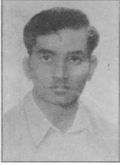
Born in a Koiri middle peasant family of Ekwari (Sahar, Bhojpur). Com. Jagdish Prasad always worked for the welfare of the downtrodden. Frustrated with the CPI(M)’s collaboration with feudal oppressors, he and his friends had initially started dreaming of building a harijanistan where harijans would at least be able to live with dignity. At this juncture, Naxalbari peasant uprising showed the way, and leaving his job of a science teacher in the Town School of Arrah, Mastersahab returned to his village to prepare the ground for a new India where power would belong to the people. A founder-leader of the Party in Bhojpur and an architect of the Bhojpur peasant uprising, Mastersahab was a beloved leader of the people and a veritable terror to the tyrant feudal forces and their henchmen. The reactionaries finally managed to get rid of him by killing him in a brutal fashion in a surprise attack in Behea Bazar. His close comrade-in-arms and a harijan-turned-proletarian vanguard, Com. Ramayan Ram, also embraced martyrdom while trying to save his leader from the cultches of the goons. At the time of his martyrdom, Mastersahab was a member of the Bihar State Committee of the Party.
Com. Rameshwar Ahir (Sadhuji) (1942- 14.1.75)
A legendary figure of the Bhojpur peasant struggle, Com. Rameshwar was born in a middle peasant family of Ekwari. Dropping out of school after the seventh standard he had first drifted into a dance troupe. But out of hatred for upper-caste landlords, militant Rameshwar subsequently turned a rebel, joined a dacoit gang, and had to suffer imprisonment for a considerable length of time. The surging peasant movement of the late 60s, however, ushered in a great change in Rameshwar’s course of life. He came in touch with Mastersahab and became a foremost figure of the peasant struggle in Bhojpur. Popularly known as Sadhuji, Com. Rameshwar died a martyr in an encounter with the police at Sonatola in Sahar on 14 January, 1975.
Com. Gyaneswar Yadav (Nagendra) (1950—May ’75)
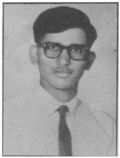
Born in a rich peasant family of Ekrashi (Bhojpur), Com. Gyaneshwar began his political life as a ‘Red Guard’ among the lower sections of peasants and other rural poor around Patna. At that time he was a student of B. N. College, Patna. Soon he left his studies and joined the movement as a professional revolutionary. A sathi (companion) in their sorrows and sufferings, and an organiser of their struggles, Com. Nagendra boldly roused and mobilised the peasant masses in anti-feudal struggles and developed peasants, armed guerrilla squads and revolutionary village committees. Till the final moment of his martyrdom in the heroic resistance against the police in the famous Ghorahuan incident, Com. Nagendra, a founder-member of the Party organisation as well as of the revolutionary peasant movement in rural Patna, worked as a disciplined soldier of the Party, who boldly asserted his own ideas and understandings but always submitted himself to the majority. He died a martyr as the secretary of the Patna-Gaya Regional Committee and a member of the Bihar State Committee of the Party.
Com. Prasant Knmar Choudhary (Shiv) (1951—4.5.76)
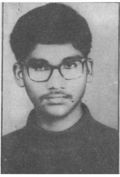
Born in a renowned intellectual family of Bihar, Com. Prasant was a brilliant student of the Patna Medical College. Deeply influenced by the Naxalbari peasant uprising, he gave up all illusions of bourgeois careerism and by 1970 he devoted himself completely to the task of developing revolutionary peasant struggles in Bihar. Soon he was arrested and kept in the Bankipur Central Jail, Patna, but by 1974 he was again in the midst of the class struggle in the countryside, thanks to a successful jail-break. He became the secretary of the Nawada-Bihar Regional Committee and a member of the Bihar State Committee of the Party, But in 1975 he again got arrested and embraced martyrdom alongwith a number of comrades while attempting to break the Bhagalpur Central Jail on 4 May, 1976.
Com. Rajendra Sah (Raju) (1942—21.11.77)
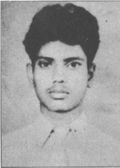
Com. Rajendra came of a middle-class family of Samastipur district. He left his studies in 1968 and joined the movement as a professional revolutionary. He died a martyr on 21 November, 1976, succumbing to a chronic heart disease. At that time he was in charge of Party work in North Bihar and was a member of the Bihar State Committee of the Party.
Com. Rajendra Prasad (Ratan) (1950—29.11.75)
Born in a progressive middle-class family of Keshat, the CPI's ‘Moscow’, Com. Rajendra grew up watching ‘communists’ collaborate with the hated landed gentry and ask the oppressed rural poor to rally behind the oppressors. The riddle was finally solved as he came to be acquainted with the path of Naxalbari. A science graduate from the Maharaja College of Arrah, young Rajendra took up the challenge of transforming the CPI’s ‘Moscow’ into a foreground of revolutionary peasant struggle. By January 1972, he was fully engaged in the task of mobilising the peasants in a militant movement. Unhesitant in criticising any mistake, whether comrnitted by himself or others, Com. Ratan earned the deep confidence, love and affection of all his comrades and the people within the short span of his revolutionary life. He sacrificed his life in Babubandh (Sahar) trying to safeguard Com. Jouhar. At that time he was a member of the Bhojpur Regional Committee and courier of Com. Jouhar.
Com. Nirmal Mahto (1.1.48—29.11.75)
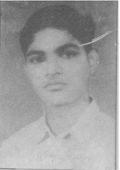
Com. Nirmal was born in a Koiri middle peasant family of Barora village in Sandesh block. He was a very brilliant student. In 1965 he matriculated from Garbani, Piro in the first division. After completing his B. Sc. from the H. D. Jain College, Arrah, Nirmal moved to the Patna Science College, to do his master’s degree in 1968. It was here in Patna that he got attracted towards communism. Subsequently he secured admission in a medical college at Lahe-riasarai, Darbhanga. Here he organised a group of fellow leftist students and came in touch with Naxalism. Since then Dr. Nirmal, as he came to be popularly known among his comrades and the people, devoted himself to rousing and organising the peasant masses. After breaking through the police encirclement at Bahuara in the beginning of July ’75, Com. Nirmal finally embraced martyrdom at Babubandh on 29 November, 1975,
Com. Prakash Chandra Mukherjee (Gopi) (1947—May ’75)
A mechanic in Patna, Com. Prakash left his job in 1968 to fully devote himself to the work of spreading the message of Naxalbari among the peasants of rural Patna. Within a year he got arrested, but by 1974 he came out of the jail, playing a leading role in the successful revolt and jail-break in Bankipur Central Jail, Patna. Once again he took up the task of organising revolutionary peasant struggle in Patna and it was in the countryside of Patna that he finally died a martyr in May ’75 putting up a heroic resistance against police encirclement at Ghorahuan (Poonpoon),
Com. Ramdas Yadav (Lalan) (1942—4.5.76)
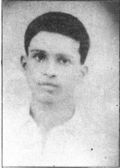
Born and brought up in a worker family of Jamalluddin-chak, Khagul (Patna), Com. Ramdas, himself a railway worker, always stood in the forefront of working-class movement. He played an active role in organising the 1969 general railway strike. He joined the Party in 1970 and gradually developed himself as a working-class Party cadre. At the call of the Party, he left his job in April 1973 to engage himself completely in the task of organising agrarian revolution in the countryside of Bihar. He was arrested of 25 August 1973, and subsequently he took a leading part in the revolt at Bankipur Central Jail, Patna, on 4 November, 1974. The jail-break was successful, but he got re-arrested. He again played a leading role in the revolt at Bhagalpur Central Jail on 4 May, 1976, but this time he died a martyr.
Com. Jai Govind Paswan (1935—17.11.81)
Born in a landless peasant family of Dumra (Arrah Mufassil), Com. Jai Govind Paswan had joined the Rohtas Industries (Dalmianagar) as a worker. Soon he came to be established as a popular, militant leader of the trade union. Simultaneously he also developed a workers' Party unit. In 1974 he left the job and moved to the countryside of Bhojpur to organise the peasants. Thanks to his hard-working nature, art of simple propaganda and agitational speeches, he succeeded in mobilising a great number of people within a short span of time. Gradually he became the political commissar of an armed guerrilla unit. Later he was entrusted with the task of organising peasant struggle in Dumraon area. The ground for today’s Mathila land movement was prepared by none other than Com. Vikas. He was arrested and killed by the police during a night-march near Mathila on 17 November, 1981.
Com. Mukhtar Ahmed (Jivan) (1958-17.11.81.)
An intelligent youth from a middle-class Muslim family of Saihar (Bhojpur) and an energetic participant in student movements of his time, Com. Jivan joined the ranks of organisers of the Bhojpur peasant struggle in January, 1974. Driven by his youthful zeal, soon he was found taking part in rifle-snatching from a police camp in Dumraon. However, he promptly shifted attention to deep-going political work, organising the youth in communist study circles while working among the peasantry. Gradually he turned into a good organiser—he built up a propoganda network to conduct political propaganda among the people, including the middle strata among upper castes, of 25 to 30 villages of Dumraon and developed local activists, people's armed forces as well as revolutionary village committees. He paid serious attention to investigation and study and derived many a creative idea from practice. In exposing and isolating the CPI in his area—ideologically, politically as well as organisationally—he played an important role. Alongwith Com. Vikas and Com. Narsing, he was also encircled, arrested and killed by the police during a night-march near Mathila on 17 November, 1981. He died a martyr as a member of the Bhojpur-Rohtas Regional Committee.
Com. Kamaleshwari Rai (Sushilji) (1928—20.1.82.)
Born in a lower-middle class family of Basdevpur (Begusarai), Com. Kamaleshwari Rai had joined the communist movement wayback in 1954. During the Naxalbari-inspired struggle against revisionism he finally broke away from the revisionist leadership and joined the revolutionary camp. No hardship or hurdle could deter him for a moment from the task of organising the people and standing by them. He was jailed in 1971 and underwent severe torture. But that could not weaken his high communist morale a bit: with his release in 1977 he once again resumed his work on the peasant front, and remained a staunch communist fighter till he breathed his last. With the profound wisdom of a veteran, spirit of a youth and simplicity of a child, Com. Sushil was really worthy of the name by which his beloved comrades-in-arms addressed him. At the time of his demise he was a member of the East Bihar Regional Committee of the Party.
Com Sanat Kumar Banerjee (Dilip) (1952—Jan ’78)
Com. Sanat came of a small jotedar family of Bainchi-gram of Burdwan district in the West Bengal He was attracted towards Naxalism while he was a student. By 1970 he left his studies to join the movement as a professional revolutionary. After working for a few months in an industrial area of West Bengal, he started working among the Bihar peasantry since 1971. And he continued this painstaking work for seven long years till he breathed his last in January 1978.
Com. Gombhira Sah ( — 3.7.77)
Born in a middle peasant family in a village in Choura-dano PS of East Champaran district, Com. Gombhira emerged as a militant mass leader and a popular Party organiser in his area. Initially he was with another communist revolutionary group, and by 1975-76 be came in contact with our Party. In 1977 he organised a militant peasant movement in Chouradano which soon assumed the proportions of an upsurge. Alarmed at this growth of peasant militancy, the local landlords and their henchmen decided to finish him off. Finally on 3 July, 1977 Com, Gombhira was done to death in Chouradano police custody. As the news of his martyrdom spread, peasants came out from nearby villages with whatever traditional weapons they could get hold of, and seeing this 7,000-strong funeral procession the policemen in the Darpa police camp all fled to the Chouradano police station. The broad peasant masses vowed to complete the unfulfilled tasks of Com. Gombhira and 20 peasant cadres became full-time cadres. Since then every year July 3 is observed as the martyrs’ day in this area.
Com. Gopal Prasad (1947—25.6.85)
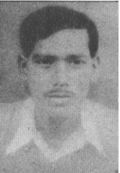
A village doctor in Makrauta village of Nalanda and a popular peasant mass leader, Com, Gopal successfully led the peasants of the area to many a victory against tyrant landlords. He was president of the Hilsa Block Committee and vice-president of the Nalanda District Committee of the BPKS. During 'Operation Task Force' he was brutally killed by the police in broad day-light in the morning of 25 June, 1985.
Com. Brajesh Mohan Thakur (Balraj) (23 8.62—15.3.86)
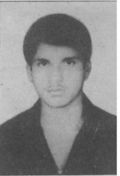
Born in a middle peasant family of Meghol village (Khodabanpur PS) of Begusarai district, Com, Brajesh came in contact with the Party in 1981 while he was a student. Soon he became active in student movement as well as in anti-autocratic movement and began to work as a professional revolutionary. He was a member of the East Bihar Regional Committee of our Party since 1982 and since 1985 he was working on the peasant front. He was a member of the National Council of the IPF and an Assistant Secretary of its Bihar unit. At a very young age he shouldered so many responsibilities with great seriousness, and through his simplicity, hard work, warm behaviour, daring initiative and firm faith on the Party, he earned for himself a special place in the hearts of numerous Party activists and the masses. Great potentials promised by Com. Brajesh got buried as he met an extremely premature end, being hacked to death by blood-thirsty landlords of Purnea district, a declining bastion of age-old feudal survivals.
Com. Premchand Ram (Kesho) (1957—6.7 85)
A landless peasant youth of Bhadwar village of Bhojpur, Com. Premchand led the people of his village in scores of struggle against feudal forces. In 1975 he joined an armed guerrilla unit of our Party and since then he participated in several successful armed actions against landlords and their goons as well as the police and paramilitary forces. Gradually, Com. Kesho achieved a significant development in his theoretical, political and organisational abilities to emerge as a fine Party organiser. He was a delegate to the Third Party Congress. He was a model for his proletarian firmness, creative thinking and comradely behaviour. Com. Kesho sacrificed his life while performing an arduous task specially entrusted on him by the Party. He was then in charge of the Party’s work in Rohtas district.
Com. Totaman Paswan (Jiut) (1957—14.11 85)
Com. Jiut was born in a poor peasant family of Baruha village in Brahmpur PS of Bhojpur district. Militant and brave, Jiut was a fighter per excellence. He had tremendous patience and initiative which enabled him to effectively tackle any situation, however difficult and adverse. He was also a successful organiser of peasants’ mass resistance against armed attacks of the enemy. Like Com. Kesho, he, too, had greatly developed his theoretical and political level over the years. A veritable terror to the enemy, Com. Jiut was shot dead by the coward police of the reactionary government while he was asleep in a shelter. At that time he was a member of the Bhojpur-Rohtas District Leading Team of the Party and in charge of the armed units of the two districts.
Com. Birda Manjhi (1935—May ’75)
A landless peasant of Dehri village in Poonpoon PS of Patna district, Com. Birda was a militant fighter and a popular leader of the landless and poor peasants of his village. He died a martyr during the Ghorahuan encounter with the police in May 1975. The landless and poor peasants of Dehri and nearby villages still do not believe that Com. Birda could have possibly been killed by the police.
Com. Puran Ram (Butan) (1953—2.7.75)
Com. Butan came of a landless peasant family of Baruna village in Sahar P.S. of Bhojpur district. He was probably the first Musahar to complete his matriculation in the entire district. After working for some time in a biscuit factory, Butan came to Calcutta in search of a job. But he returned to his village armed with the ideology of Naxalism. In 1973 he became a whole-time cadre of the Party. Soon Butan ‘Master’, as he was affectionately called by the people whom he taught to read and write, became a frontranking commander of the ‘Red Army’ of his time. He embraced martyrdom on 2 July, 1975, in the famous battle of Bahuara (Sahar, Bhojpur) after holding out against a massive contingent of CRP and Jat Regiment forces for no less than 65 hours.
Com. Narayan Mahto (Kaviji) (1921—31.3.76)
Born in a poor peasant family of Semraon village in Charpokhri PS of Bhojpur Com. Narayan received formal education only upto the seventh standard, but he grew up to be a rhymester, a gifted 'kavi' of the people. Deeply influenced by the Naxalbari peasant uprising, Narayan Kavi joined the Party in the early 70s. With his songs serving as a fountainhead of inspiration and courage for the struggling masses, Kaviji became a target of the government and its police. On many an occasion he was able to give the police the slip, notable among them being the Bahuara encirclement on 2 July, 1975, and the police cordon in Baruhi village on 17 August, 1974. But finally on 31 March, 1976, in the early hours of the morning he got trapped in the police cordon while walking from Gurpa village to Hanuman-Chapra, a village close to Ekwari, in Sahar. Kaviji died a martyr bequeathing a bouquet of songs and courage to his people.
Com. Suresh Mahto (1962—2.6.75)
Martyred at the age of 13, Com. Suresh is the youngest of the martyrs of the Bihar peasant struggle. Son of martyr Comrade Narayan Kavi, Suresh started working as a regular Party activist at the age of ten. Once the police beat him for hours but could not extract a single piece of information regarding the whereabouts of his revolutionary father. On 2, June, 1975 he was hacked to pieces by the notorious landlords of Hadiabad village in Jagdishpur PS as they went on a rampage in the Harijantola.
Com. Sonamati (Agni) (1950—31.12 75)
Com. Agni belonged to a shopkeeper family of Sandesh village of Bhojpur. Wife of martyr Comrade Anant Lal Gupta, she left her two children back at home to devote herself exclusively to the work of the Party. She was appointed political commissar of the Second Armed Unit of Women. Despite acute ulcer, she participated in hard manual labour as well, e.g, carrying soil in baskets to help others carry on digging a tunnel. She developed a revolutionary committee in Pinjrohi village and assisted Com. Lahari in forming a guerrilla squad there. She embraced martyrdom alongwith Com. Lahari, fighting against the police encirclement in Pinjrohi on 31 December, 1975.
Com. Lahari (1957—31.12.75)
A Landless peasant woman of Ramasaar village in Sandesh block of Bhojpur, Com. Lahari experienced severe economic exploitation as well as social oppression throughout her life: whether at home or in her father-in-law’s house. Once, when she came home after marriage, she came in contact with the Party. She was so attracted by the Party’s aims and objectives that she immediately decided to join it. In the face of strong opposition from elders against her unique decision, one night she secretly walked out of the house to join the armed unit. While in the unit, she vigorously aroused the peasant masses in the struggle for liberation from all exploitation and oppression. Within a short period, she became the commander of the Second Armed Unit of Women then operating in Sandesh block. She concentrated her work in Pinjrohi village where she led the peasants in many a struggle against the landlords. In the early hours of the morning of 31 December, 1975, a posse of 300 armed policemen acting on a tip-off, encircled the Harijantola of Pinjrohi. Com. Lahari immediately mobilised the villagers in a heroic resistance against the police, and as many as four times she was able to temporarily push the enemy back. But as she ran out of ammunitions she was cowardly shot dead by the police.
Com Sheila Chatterjee (Tutu) (1956—10.10.76)
Com. Sheila came of an intellectual family. She was a student when she joined the Party as a whole-time cadre. Through a hard struggle she integrated herself with the landless and poor peasants of Bhojpur. Loyal, sincere and resolute, Com. Sheila embraced martyrdom during a resistance struggle against police encirclement in Ekwari (Sahar) on 10 October, 1976.
Com. Jeerwa Devi ( —June ’82)
A landless peasant woman of Gandharmath in Ghosi block of Gaya, Com. Jeerwa Devi led the woman of her village in struggle for wages and land as well as against sexual oppression and social discrimination. In June '82, when she was marching in the forefront of a BPKS procession towards Ghosi alongwith her fellow village-women to protest against the murder of martyr comrade Sankar Choudhary, a peasant cadre of Sahobigha village, the police and landlords jointly opened fire on the procession near Gorhsar village. With the BPKS banner in her hand, Jeerwa Devi dropped dead while many others suffered injuries.
Photo of Some Others Martyrs
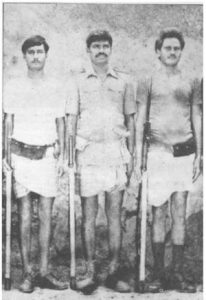
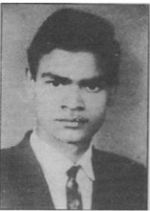
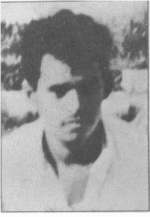
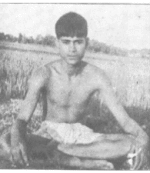
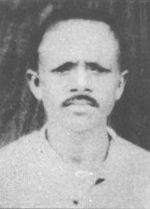
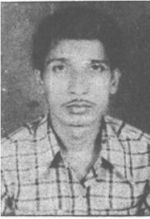
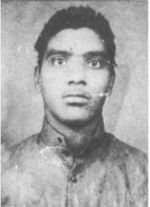
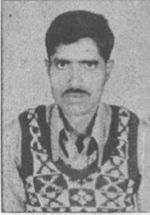
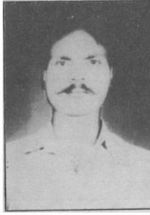
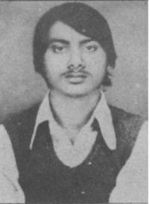


memory of Kaithi martyrs

